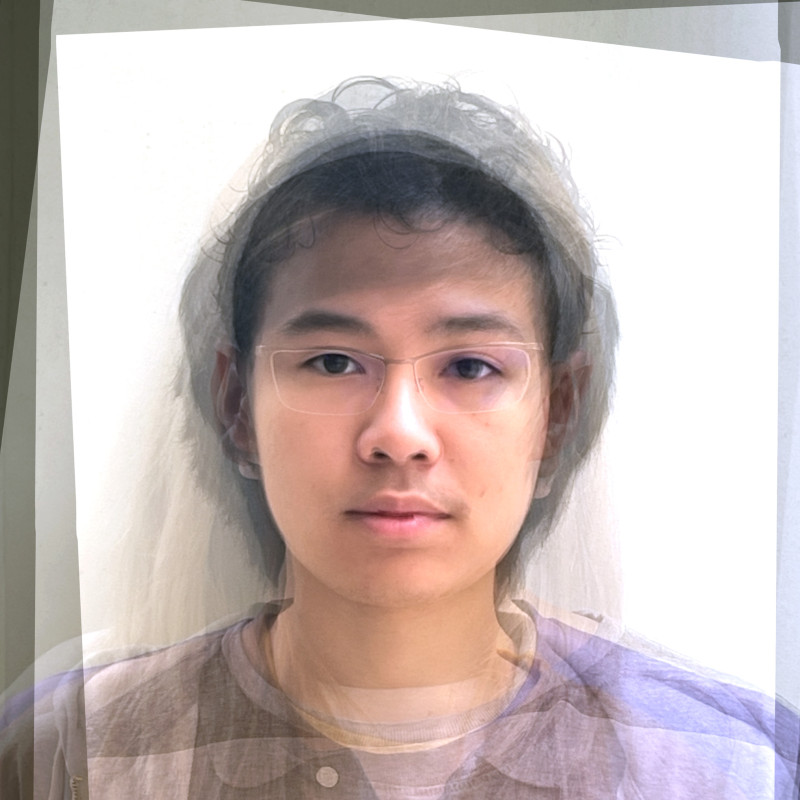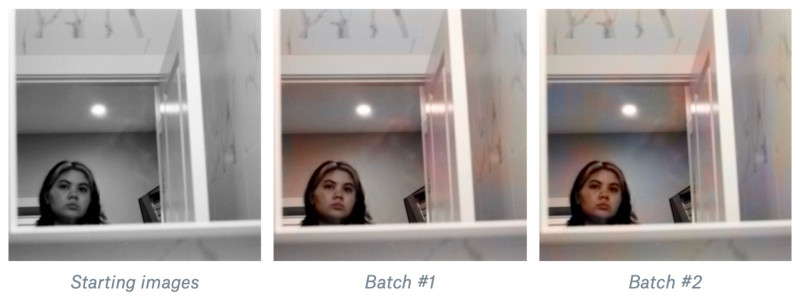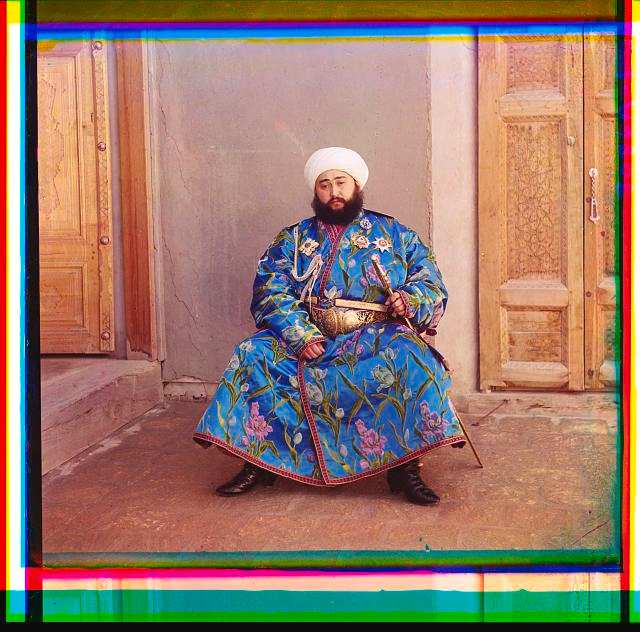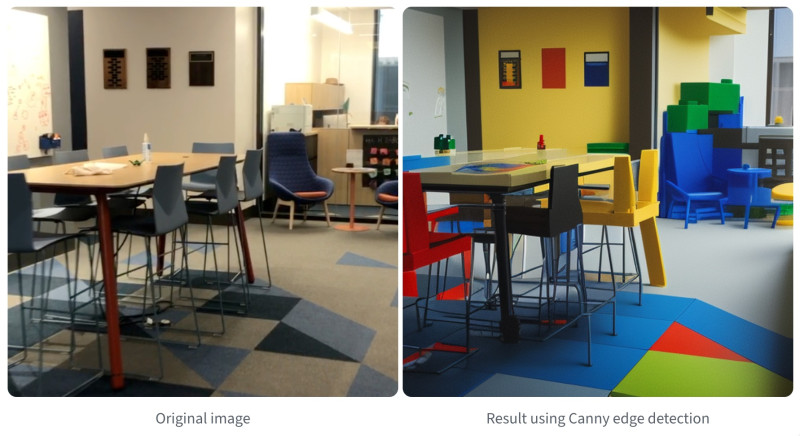Machine Learning for Artists

Scripps College MS160
Fall 2024
Location: TBD
COURSE STAFF
Professor: Douglas Goodwin
Email: dgoodwin@scrippscollege.edu
COURSE OVERVIEW
This course explores advanced topics in computational photography, focusing on image formation, processing, alignment, enhancement, and manipulation. Students will engage in building both physical and digital cameras, exploring digital image processing techniques, and creating projects that integrate these skills.
COURSE MODULES
Module 1: Image Formation and Capture
- Week 1: The First Digital Camera
- LAB 01: Make a portrait with specs from first digital camera (10 pts)
- LAB 02: Forming images with the Camera Obscura (25 pts)
- Week 2-3: Controlling Exposure
- LAB 03: Effects of Shutter Speed on images (25 pts)
- Week 4: Aperture
- LAB 04: Artifacts and Noise from high gain settings (25 pts)
- Week 5: Image Storage Formats
- LAB 05: Exploring Image Formats and Metadata (20 pts)
Module 2: Image Processing Fundamentals
Prerequisite: Module 1
- Week 6: Image Kernel Convolutions
- LAB 06: Exploring Image Kernels and Convolution (25 pts)
- Week 7: Instagram Filter Creation
- LAB 07: Code Convolutions for custom filters (25 pts)
- Week 8: Color Representations
- LAB 08: Exploring Digital Color Models (25 pts)
Module 3: Image Alignment and Enhancement
Prerequisite: Module 2
- Week 9: Feature Identification and Alignment
- LAB 09: Aligning Prokudin-Gorsky's Photos (30 pts)
- Week 10: Sensor Noise
- LAB 10: Cross-dissolve Jekyll and Hyde (10 pts)
- LAB 11: Image alignment with Homography and dlib (10 pts)
- Week 11: Panoramic Photography
- LAB 12: Panorama Stitching Lab (30 pts)
- Week 12: Light Field Photography
- LAB 13: Understanding Light Field Cameras (25 pts)
Module 4: Advanced Image Manipulation
Prerequisite: Module 3
- Week 13: HDR Imaging
- LAB 14: The Average CP2 Student (30 pts)
- Week 14: Image Compositing
- Optional LAB: MJ Lab Image Compositing
Course Schedule
| Module | Lecture | Lab Assignment | Due Date | Points |
|---|---|---|---|---|
| 1: Image Formation and Capture | ||||
| Lecture 01: Forming Images | LAB 01: First Digital Camera Portrait | Jan 26 | 10 | |
| LAB 01: Camera Obscura Images | Jan 25 | 25 | ||
| Lecture 03: Controlling Exposure | LAB 02: Shutter Speed Effects | Feb 8 | 25 | |
| Lecture 02: Aperture | LAB 03: High Gain Artifacts and Noise | Feb 15 | 25 | |
| Lecture 04: Image Storage | LAB 04: Image Formats and Metadata | Feb 22 | 20 | |
| 2: Image Processing Fundamentals | ||||
| Prerequisite: Module 1 | ||||
| Lecture 06: Image Kernels | LAB 06: Kernel Convolutions | Feb 29 | 25 | |
| Lecture 07: Instagram Filters | LAB 07: Custom Filter Creation | Mar 7 | 25 | |
| Lecture 08: Color Representations | LAB 08: Digital Color Models | Mar 21 | 25 | |
| 3: Image Alignment and Enhancement | ||||
| Prerequisite: Module 2 | ||||
| Lecture 09: Feature Alignment | LAB 09: Prokudin-Gorsky Photos | Mar 28 | 30 | |
| Lecture 10: Sensor Noise | LAB 10: Jekyll and Hyde Cross-dissolve | Apr 11 | 10 | |
| LAB: Homography and dlib Alignment | Apr 5 | 10 | ||
| Lecture 11: Image Stitching | LAB 11: Panorama Stitching | Apr 18 | 30 | |
| Lecture 12: Light Fields | LAB 11: Light Field Cameras | Apr 25 | 25 | |
| 4: Advanced Image Manipulation | ||||
| Prerequisite: Module 3 | ||||
| Lecture 13: HDR Images | LAB 13: Average CP2 Student | Apr 25 | 30 | |
| Lecture 14: Image Compositing | LAB 14: MJ Lab Compositing (Optional) | Apr 30 | 0 |
TECHNICAL REQUIREMENTS
Equipment
- Modern laptop capable of running required software
- Access to departmental resources for specialized equipment
Software
- NumPy
- OpenCV
- Additional tools as specified in lab requirements
ASSESSMENT
- Assignments and Projects: 50%
- Participation and Attendance: 25%
- Final Project: 25%
Rubric for Creative Projects
Based on Kristin Hughes' "Learning and Grading Rubric"
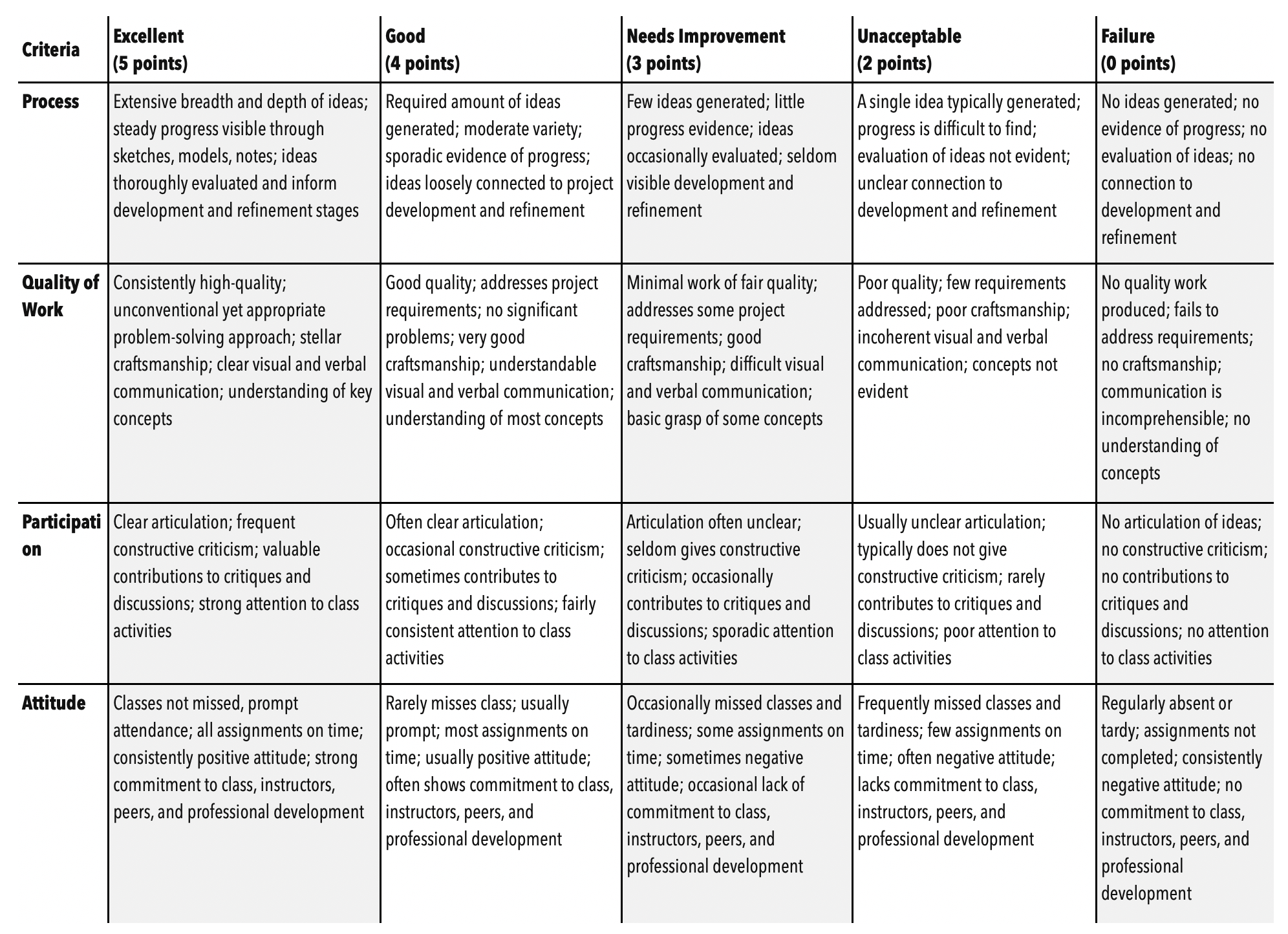
Percentage Calculation: Total points × 5 = Final percentage
(Example: 15 points = 75%)
COURSE POLICIES
Attendance
- More than six unexcused absences will result in course failure
- Regular attendance required for both lectures and labs
Changes to the Syllabus
This syllabus is subject to change. Students are responsible for staying informed about updates, which will be communicated via Discord. All assignments should be prepared for the scheduled class day unless noted otherwise.
Zoom Notice
Class meetings held on Zoom may be recorded for educational purposes. These recordings are protected and used solely to support course facilitation. Students and participants are prohibited from making their own recordings. Students needing special accommodations for recordings should coordinate with the instructor.
Academic Integrity
Academic integrity is crucial to our educational mission. Academic dishonesty, including but not limited to cheating, fabrication, plagiarism, multiple submissions, or facilitating misconduct, undermines trust and learning. Plagiarism, the presentation of another author's words or ideas as your own, is a serious offense. Consult your instructor with any questions about documentation or quotations before submission.
Accessibility and Accommodations
Our goal is to make learning accessible for all students. If you face any issues with course materials or requirements, please contact me to discuss potential solutions. Students with disabilities are encouraged to consult the Office of Accessible Education for guidance and official accommodations. If you have approved accommodations, let's meet to devise an implementation plan. We are committed to meeting accessibility standards and welcome your feedback on improving access to course materials.
Inclusive Environment
We are dedicated to an equitable and inclusive learning environment, free from discrimination and harassment such as sexual violence, dating violence, and stalking, which violate college policies and legal standards. This policy applies to all individuals associated with the college. Violations can result in disciplinary actions, including expulsion or termination. A climate of mutual respect and open dialogue is essential, and speech is protected if it doesn't constitute harassment or discrimination.
Diversity
Our diverse community is a strength that fuels innovation and enriches education. We commit to reflecting this diversity within our student body and workforce, ensuring access for talented individuals from all backgrounds. By fostering an environment where ideas are shared respectfully, we enhance innovation and leadership development. We focus on removing barriers for underrepresented groups in all institutional activities.
